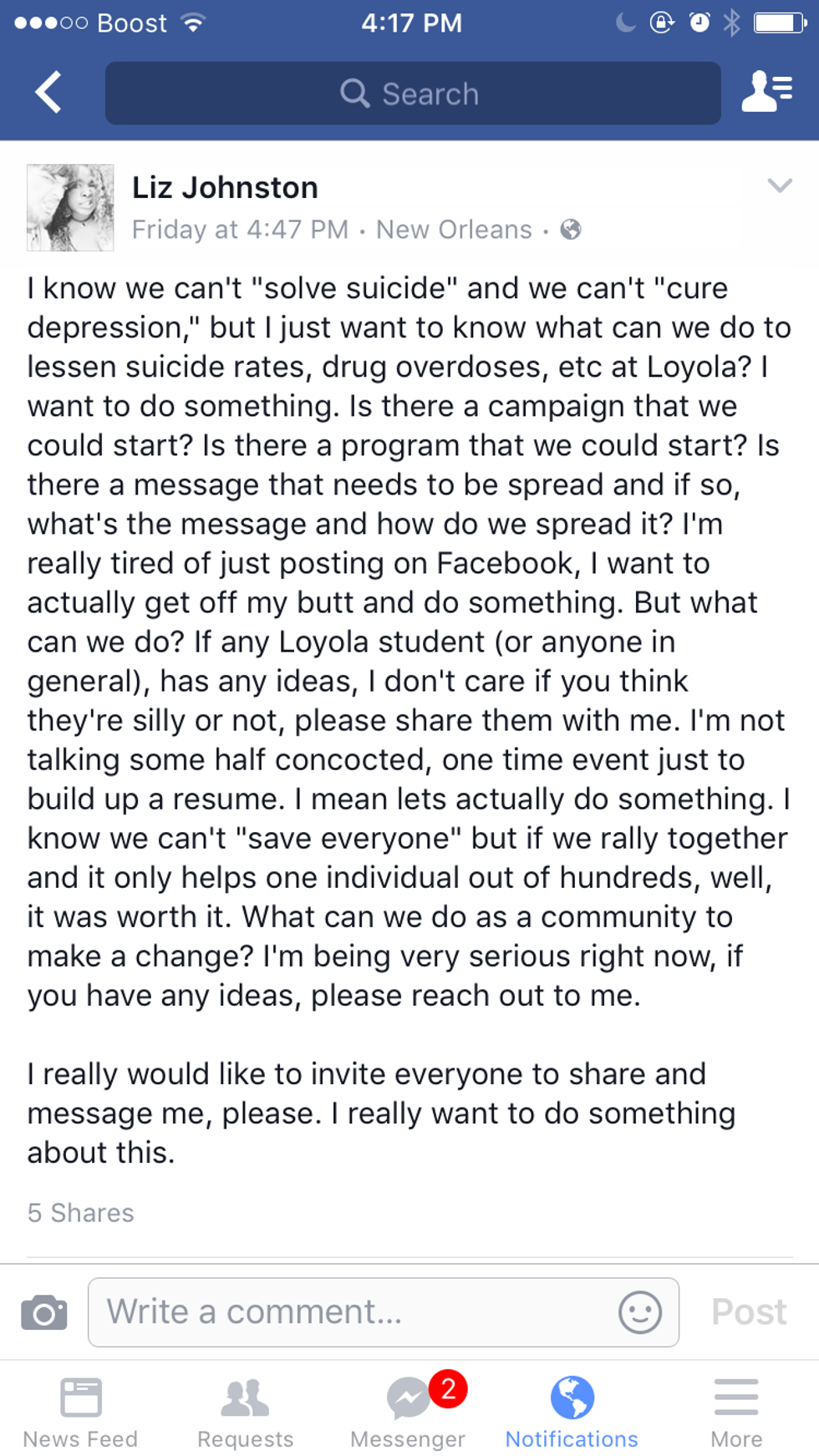I've long given up the idea that I am going to "save the world." However, my desire to "do something" has never faded away. I'm an outspoken person. I post my opinions on social justice issues and politics on Facebook. I write for publications. But recently, writing just isn't cutting it for me. I don't feel like posting a status is helpful anymore. I want to actually, physically go out and do something to make a change.
According to a local news article by WDSU, four Loyola students have died since January 2016. Two of which died on campus. That's almost one person per month. I know that some people might say, "Well, that's not a lot. College students die all the time! It just happens." But at a campus that's only a few blocks wide with less than 5,000 students total, four is a considerable amount of deaths. Another crucially important aspect is to remember that these students were not just numbers or statistics. They were members of our communities and, most importantly, they were human beings.
We should never take the deaths of students lightly or just pass it off.
With speculations and rumors of suicide, drug overdoses, and other harmful practices occurring on campus, it's time that we as a community do something about it. We can't keep passing it off with a, "Oh, well, it happens" kind of attitude. No duh, it happens, but what are we going to do to stop it!
It took me quite some time to start noticing the small posters around campus that warn students not to do drugs and to seek help with their problems. However, this is just the equivalent of your parents telling you, "Uh, drugs are bad," and "Suicide can kill you." Posters with a "this is your brain on drugs," kind of attitude are not enough. In fact, I'm not even sure if they're helpful. How are we going to actually go about effectively addressing this issue?
Loyola officially declared itself a "Tobacco Free Community," back in 2015, but students still blatantly smoke in front of the "no smoking" signs. If a huge campaign to stop students from smoking isn't preventing students from smoking in public, then how are signs around campus going to stop harmful behaviors behind the closed doors of a campus dorm room? How are we going to help our students who are struggling with mental health issues or harmful coping methods? Is there a way to show that we care about people BEFORE they die and we have to start planning candle light vigils around the unpredictable New Orleans weather. Is there a way to support people before we need to start sending out emails to inform people that the university counseling center and mission and ministry are available for grief support AFTER a member of our community has already died?
Since all I know how to do is post to Facebook, I posted a status asking for the input from my fellow students:
I got a few shares, likes, and a couple of really great comments. However, I'm still not sure where to start.
Someone mentioned normalizing mental health and to start getting people to talk about it. People don't tend to talk about mental health as a sickness. Mental health issues are often treated as something that is imagined or that individual can just choose to make disappear. People often want to keep their issues private (which is their right), but it is often kept so private that it goes untreated, which can lead to horrible consequences and harmful behaviors.
If removing the stigma is the starting point, then how can we go about normalizing talking about things like depression and substance abuse? How do we stop sounding like a broken record, a parent who "doesn't understand," like a cheesy "being sober rules, substance abuse is not cool," middle school anti-drug use slogan, or an informative poster that people will ignore as they walk through the hall. How do we start sounding like to form a supportive community of students who can make a change in our peers lives and well -- keep them alive? How do we get rid of the stigma and normalize the process of reaching out for help?

























